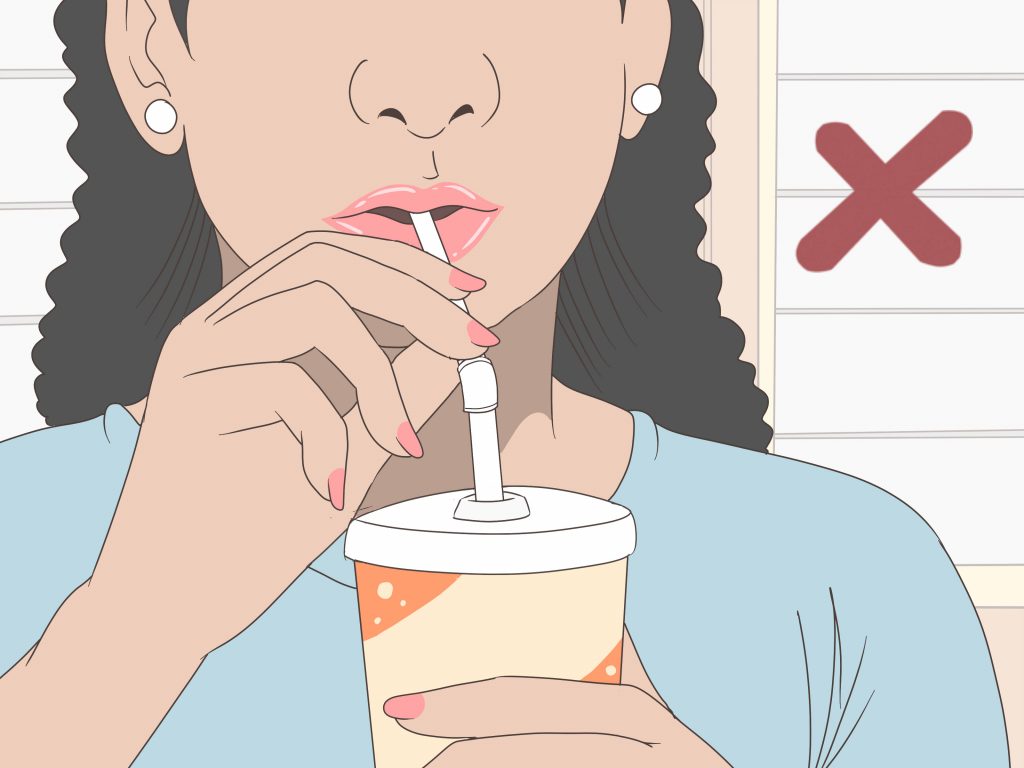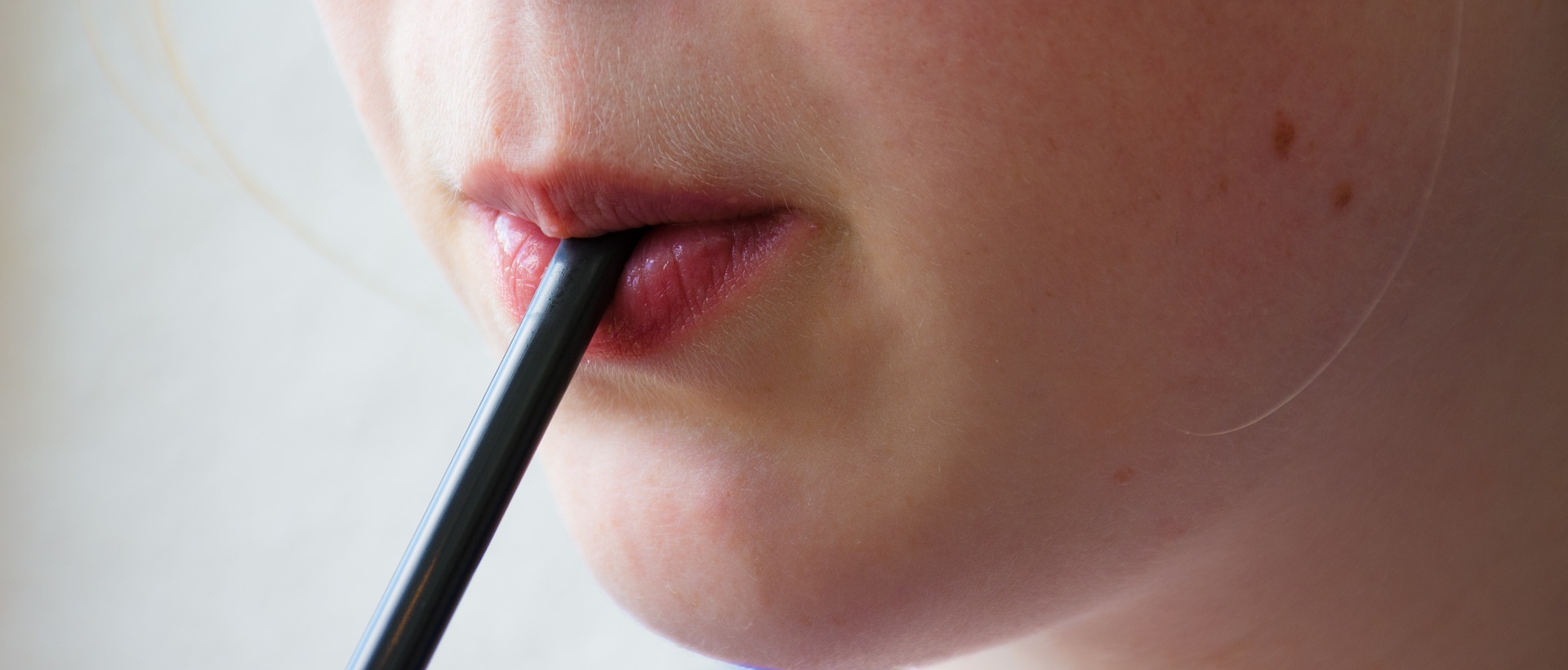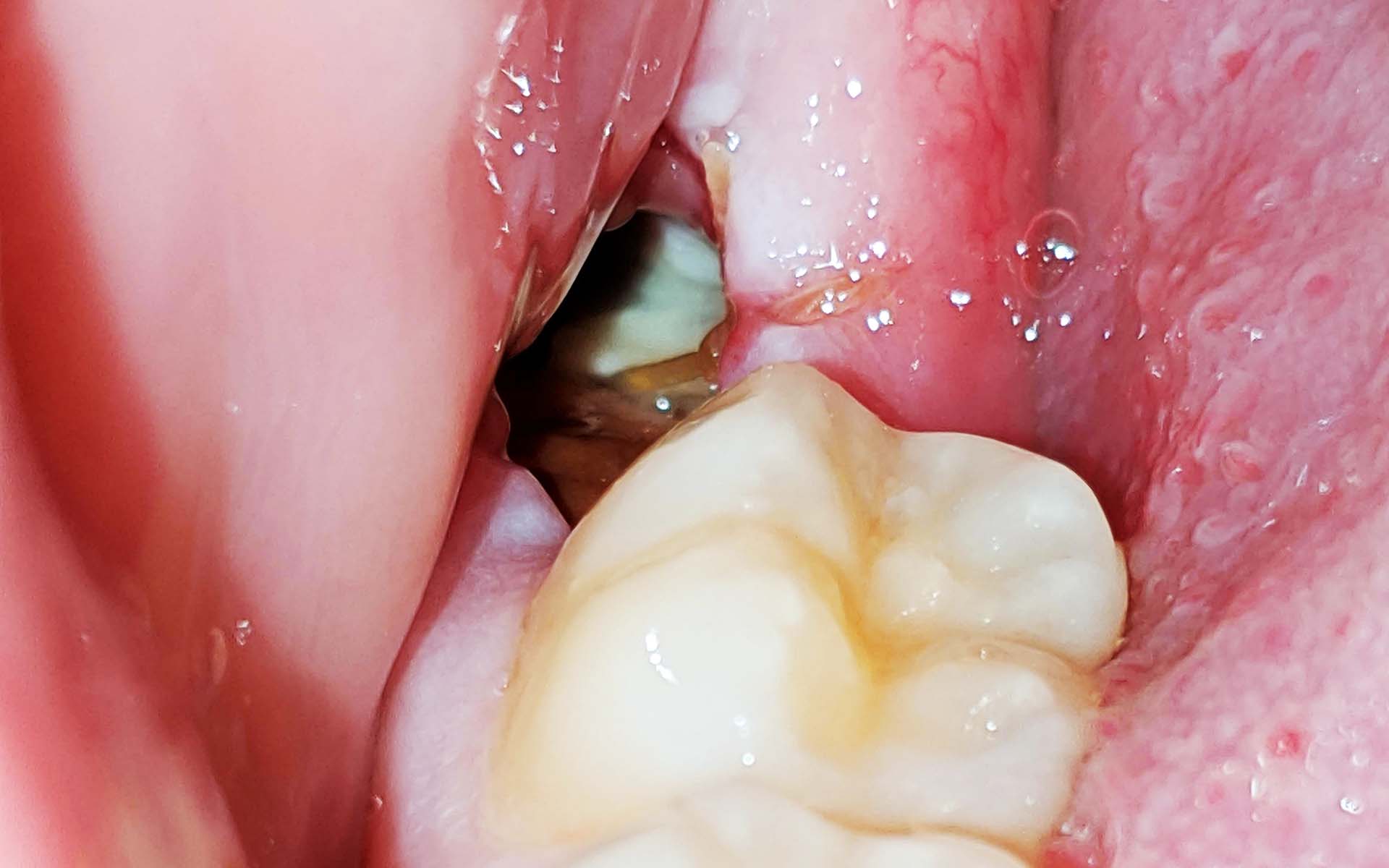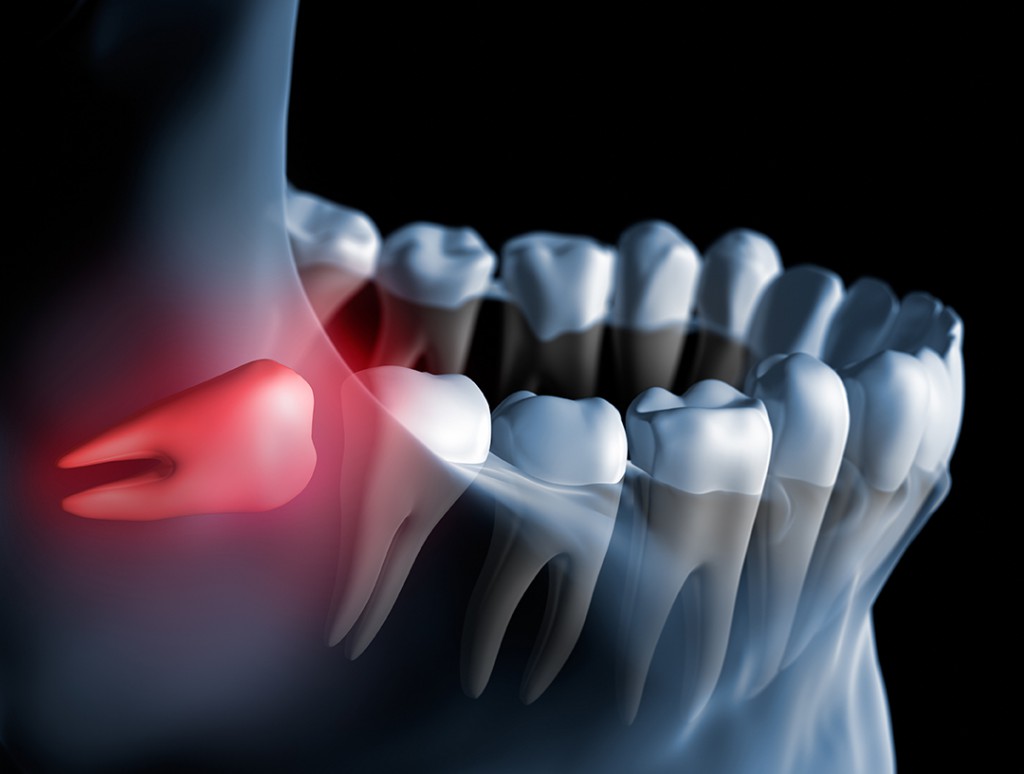A. What Is The Deal With Straws After Wisdom Teeth Removal?

Any dentist will tell you not to use a straw after removing your wisdom teeth, but why not and when can you do it again? It’s just straw, how bad can it be?
1. When can I use a straw after wisdom tooth extraction?
You can start using a straw the next day after your wisdom tooth is removed, but you should avoid using a straw that day as you don’t want to hinder the formation of the blood clot. Drinking through a straw while a blood clot is trying to form can stop the formation by dislodging the clot. The reason for this is that drinking through a straw creates a lot of pressure in the mouth and this pressure can loosen and remove the blood clot.
The nugget of wisdom is that any kind of intraoral pressure will break up a blood clot, and this applies to more than just drinking through a straw after your wisdom teeth are removed. The same principle also applies to spitting and flushing, which is something you shouldn’t do after pumping. Let’s review the three things you shouldn’t do later because they create too much pressure in your mouth. The three things you shouldn’t do after having your wisdom teeth pulled because you’re putting too much pressure on your mouth.
- Don’t drink through a straw.
- No spitting.
- No conditioner.
All three of these rules apply on the day of the proceedings. When the next day comes and the sun comes up, you can drink through a straw, spit and flush as much as you like! Just to reiterate, you just can’t do them on the day of surgery. Our Long Island City dentists will repeat these three rules to you three times so you don’t forget them. You will also receive a follow-up form from us.
2. Why shouldn’t I use a straw after removing my wisdom teeth?

You should not use a straw after removing the wisdom teeth because if you break the blood clot, the extraction socket will continue to bleed. After the extraction, we want to achieve hemostasis, i.e. to stop the wound as quickly as possible. Stopping the bleeding is very important because uncontrolled bleeding can be fatal and cost you a trip to the emergency room in the middle of the night. If you break the blood clot with a straw while drinking, the wound will bleed for a long time.
3. Will using a straw after wisdom tooth removal cause a dry socket?
Contrary to popular belief, using a straw after removing your wisdom teeth does not result in a dry socket, and there is no evidence to the contrary. The reason for this is that a dry socket is a biological process and not caused by a mechanical process such as the blood clot loosening from excessive pressure in the mouth.
The study conducted tested more than 200 extracted teeth to determine whether the use of straws caused dry tooth socket when wisdom teeth were extracted. Half of the group used a straw with every meal for the next 2 days after the operation, the other half did not. The results were as follows.
- Of those who used a straw, 15% developed a dry socket.
- Of those who did not use a straw, 15% developed a dry socket.
The conclusion was that the use of a straw after third molar extractions had no effect on the formation of alveolitis. This means our common belief that straws cause dry sockets was proven dead wrong.
4. What is a dry socket?
This is absolutely fascinating information, including for our LIC dentists, because a dry socket, also known as alveolar osteitis, usually results when a blood clot does not form in an extraction socket. Dry socket is a very painful condition that takes a few weeks to resolve on its own. Interestingly, with this new information, it appears that the painful dry socket condition only develops when your body is unable to form the blood clot naturally. If you break the blood clot by drinking through a non-compliant straw, your body won’t punish you with a painful dry socket.
B. Why Can’t I Suck Out Of A Straw After Wisdom Teeth Removal And Oral Surgeries?

After wisdom teeth are pulled or multiple molars are removed at once, you are usually presented with a list of things to do with various rules for better healing. You must NOT use a straw to drink. Instead, you should drink it straight from a cup or mug.
1. But why?
After the teeth are extracted, a fibrous blood clot forms at the base, protecting the exposed bone from air and bacteria and allowing for faster healing. When the clot is broken open or sucked in by bacteria, it forms a dry pad that is extremely painful. Extremely painful! If the socket is dry, the doctor must place a bandage around the socket to cover the exposed bones and nerves, and then come back often to change the bandage. If you’re having trouble eating or drinking nutritious food after these procedures, a NutriSqueeze bottle with a straw that extends to the bottom of the bottle may be the right tool for the task. You can put liquid food, puree or smoothie in these bottles and simply squeeze the bottle to drop the drink or food in a place in your mouth where you can swallow it.
2. How long after tooth extraction can you use a straw?
After the tooth is extracted, a layer of blood forms in the jaw where the tooth was located. This blood tissue is the first stage of healing after extraction. Any type of mouth suction can loosen blood tissues and delay healing or even cause a painful condition known as dry socket. It is recommended not to drink from a straw for three days after tooth extraction as this is the highest time drainage can occur. It is not recommended to suck your mouth during these three days, especially not to spit and smoke. The above information is for reference only. The medical decision should not be made before consulting a doctor. The masculine form may have been used more frequently in the article, but without affecting readability.
C. When Can I Use A Straw After Tooth Extraction And Avoid Dry Socket?

Your dentist will give you a long list of instructions to speed up the healing process after tooth extraction, and one of those instructions is not to use a straw. So if you’re an avid soda drinker, you’re probably wondering: When can I use a straw after a tooth extraction? While almost all dentists recommend waiting at least 24 hours before using a straw, most recommend waiting even longer. In fact, most recommend waiting a few days.
1. Why shouldn’t I use a straw after a tooth extraction?
A blood clot forms immediately after tooth extraction. If you use a straw after tooth extraction, there is a risk of dislodging the blood clot at the extraction site. This is because sucking on a straw creates suction that can cause the blood clot to break loose. This can be painful and lead to a dry socket and infection. The blood clot helps the wound heal. It stops bleeding after tooth extraction, covers the hole where the tooth was before extraction, and protects the bone and nerves that are exposed after extraction. If you think your blood clot has dislodged, it’s a good idea to call your dentist. They can advise you if you need to go to the office for an assessment.
2. Can I use a straw if a blood clot has formed?

Once a blood clot has formed at the site of the mouth, this is a good sign that you are on the healing path after tooth extraction, but you must keep it intact. The best way to ensure this is to follow your dentist’s post-op instructions and take proper care of the area. That means you should avoid things like drinking through a straw before the time your dentist recommends — even if the blood clot has already formed.
3. How many days after extraction can I use a straw?
It is usually recommended to wait at least 24 hours before deciding to drink anything through a straw. However, the cells responsible for healing begin to function after the second or third day. In fact, you shouldn’t do anything that causes a sucking motion, like spitting or smoking. By avoiding sucking movements, you can avoid a dry socket and avoid a lot of pain. Your age and medical history also affect the healing process, so your dentist may have different instructions.
4. When can I stop worrying about a dry socket?
Alveolitis is the most common complication patients experience after a tooth extraction; means the bone has been exposed due to a missing blood clot and can be quite painful. The good news is that by avoiding certain activities, you can help prevent a dry socket. These include smoking, flushing heavily, drinking hot beverages, and using straws. Once your mouth is fully healed, you no longer have to worry about the dreaded dry mouth.
D. The Dangers Of Straws When Oral Surgery Is Healing

Oral surgery is most common, with wisdom teeth removal being the most popular form of surgery. Whether it’s a tooth extraction, dental implant or gum treatment, oral surgery doesn’t have to be a hassle. If you follow the doctor’s simple tips and guidelines, there is no reason not to recover soon after oral surgery.
1. Oral care after oral surgery
After the procedure is complete, your doctor will provide you with a list of instructions to follow to promote a faster recovery. You must be careful to follow each of their instructions to the best of your ability.
Here are some of the most important things to consider immediately after oral surgery:
- Eat a light diet for at least two days.
- Do not eat crusty foods or very hot or cold foods or drinks.
- Keep your mouth clean by rinsing with warm salt water at least four times a day for a week after the procedure.
- Cool the area for 15 minutes and 15 minutes to reduce swelling for the first two days after the procedure.
- Do not drink through a straw for at least 24 hours, if not longer.
2. Why straws are bad after oral surgery or wisdom tooth removal
After oral surgery, you should not drink any beverages through a straw for at least 24 hours. The suction and force with which the drink gets into the mouth can cause the clot in the wound to rupture, which can lead to dry tooth decay. When the clot covering the wound is released, the bone and sensitive nerves in the area are left exposed. This causes extreme pain, discomfort and, in many cases, infection. To prevent dehydration, it is imperative to follow your doctor’s instructions not to drink through a straw for at least 24 hours after oral surgery.
E. Tips To Help Avoid A Dry Socket After Wisdom Teeth Extraction

After visiting our doctors in Pasadena for your wisdom tooth extraction, your body will naturally form a blood clot at the surgical site. This is how your body protects and heals your jawbone and nerve endings. However, under certain circumstances, this blood clot can break loose and in this case, a painful condition known as a dry socket ensues. Dry socket leaves Pasadena patients with severe pain in the open socket where the tooth used to be and along the nerve endings that run down the sides of the face. Our doctors want to help you avoid this painful condition, so read on for some essential tips to keep the pain at bay.
1. This will avoid a dry socket
As you will see, the occurrence of a dry socket is mainly attributed to sucking or eating hard food before being eliminated by our doctors. When you leave Lytle, Tate & Stamper after your wisdom tooth extraction, be sure to follow the instructions for a “T” so you heal well and avoid a dry socket. Here are some specific tips to avoid this painful complication after wisdom tooth extraction:
a. Do not use straws
Avoid using straws for at least a week after a wisdom tooth extraction to avoid a dry socket. The suction motion required to use a straw can remove the much-needed blood clot covering the surgical site.
b. Don’t smoke
Men and women from Pasadena know that smoking is bad for your health – in every sense. And your oral health is no exception. When it comes to smoking after a wisdom tooth extraction, you must choose not to. Smokers are at very high risk of developing a dry socket after the procedure because the rapid inhalation and movement of smoking can dislodge the blood clot from the surgical site. And don’t think that cigarettes are the only culprit. Smoking can loosen the clot, and believe me, the pain from a dry socket isn’t worth the risk.
c. Eat soft foods

After visiting our doctors in Pasadena for your wisdom tooth extraction, you should stick to a liquid diet for the first day. After that, it is important that you return to your normal diet. Eat only soft foods like applesauce, mashed potatoes, and bananas for the first few days. Don’t eat anything crunchy or hard until our doctors give you the go-ahead.
d. Practice proper oral hygiene
Our doctors will send you home with specific instructions on proper oral care after your wisdom tooth removal. These instructions provide guidelines for proper oral hygiene. On the first day after the operation, you should not brush your teeth with a toothbrush, but gently rinse your mouth. Keep in mind that you don’t want to do anything to remove the blood clot from the surgical site. However, keep your mouth clean with good oral hygiene to prevent infection.
2. Conclusion
So far you’ve established that you shouldn’t drink from a straw for at least the first 24 hours after dental surgery, but waiting a few days is even better. After oral surgery, it’s important to follow your dentist’s instructions to ensure a speedy and safe recovery. Your dentist will advise you to avoid drinking through straws, as well as other activities that involve a sucking motion, such as smoking cigarettes or flushing heavily. The first step in proper healing is the formation of a blood clot over the extraction site. Everything you do over the next week or a few weeks will focus on holding that clot so it doesn’t break loose. This is important because the clot protects your bones and nerves after oral surgery.


